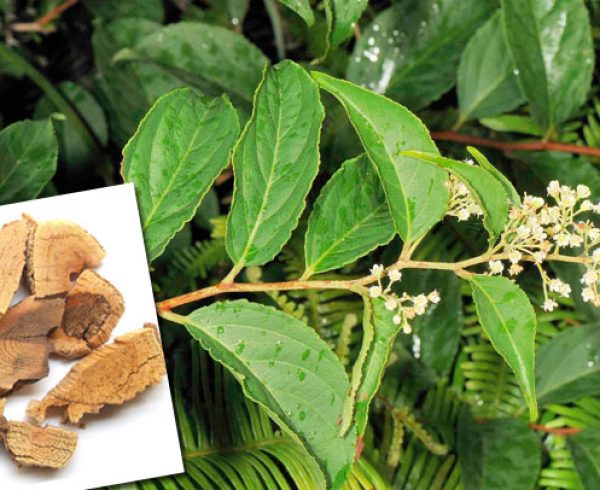An ingredient used in traditional Chinese medicine could help treat obesity, researchers have found. They say an extract from the thunder god vine reduces food intake and causes up to a 45% decrease in body weight in obese mice.
The weight-loss compound, called Celastrol, produces its potent effects by enhancing the action of an appetite-suppressing hormone called leptin. The researchers say their findings, published in the journal Cell, are an early indicator that Celastrol could be developed into a drug for the treatment of obesity.
Senior study author Doctor Umut Ozcan, an endocrinologist at Boston Children’s Hospital and Harvard Medical School in the US, said: ‘During the last two decades, there has been an enormous amount of effort to treat obesity by breaking down leptin resistance, but these efforts have failed.
‘The message from this study is that there is still hope for making leptin work, and there is still hope for treating obesity.
‘If Celastrol works in humans as it does in mice, it could be a powerful way to treat obesity and improve the health of many patients suffering from obesity and associated complications, such as heart disease, fatty liver, and type 2 diabetes.’
Leptin is a fat cell-derived hormone that signals to the brain when the body has enough fuel and energy.
Humans and mice that lack leptin signaling eat voraciously and become morbidly obese, suggesting that leptin-enhancing drugs may be effective for treating obesity.
However, leptin doesn’t reduce hunger or food intake in obese people despite high levels of the hormone in the bloodstream, leading many researchers to speculate that leptin insensitivity is the root cause of obesity.
[cm_ad_changer campaign_id=”1″ debug=”0″]
Despite longstanding research efforts, drugs that can effectively alleviate leptin resistance have not yet been found.
In the new study, Dr Ozcan and his team found that within only one week of Celastrol treatment, obese mice reduced their food intake by about 80 per cent compared to untreated obese mice.
By the end of the third week, treated mice lost 45 per cent of their initial body weight almost entirely by burning fat stores.
The dramatic weight loss is greater than that produced by bariatric surgery – an operation on the stomach that helps extremely obese patients to lose weight.
Celastrol also decreased cholesterol levels and improved liver function and glucose metabolism, which collectively may translate into a lower risk of heart disease, fatty liver, and type 2 diabetes.
Even though Celastrol didn’t produce toxic effects in mice, Dr Ozcan strongly urged caution for now because in-depth toxicology studies and controlled clinical trials are needed to demonstrate the compound’s safety in humans.
He said: ‘Celastrol is found in the roots of the thunder god vine in small amounts, but the plant’s roots and flowers have many other compounds.
‘As a result, it could be dangerous for humans to consume thunder god vine extracts to lose weight.’
Dr Ozcan added: ‘In the end, my main goal is to see this research leading to a novel and powerful treatment for obesity in humans.’
Thunder god vine is a perennial vine native to China, Japan, and Korea. It has been used in China for health purposes for more than 400 years. In traditional Chinese medicine, it has been used for conditions involving inflammation or overactivity of the immune system. Currently, thunder god vine is used as a traditional or folk remedy for excessive menstrual periods and autoimmune diseases, such as rheumatoid arthritis, multiple sclerosis, and lupus.
 Mark Prigg is a US Science and Technology Editor @MailOnline, Welsh, Cardiff City fan, and primate enthusiast.
Mark Prigg is a US Science and Technology Editor @MailOnline, Welsh, Cardiff City fan, and primate enthusiast.







Leave a Comment